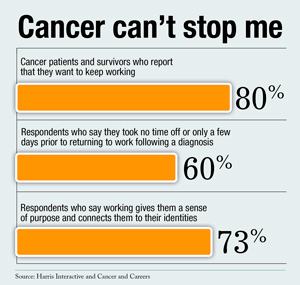
Almost 80 percent of cancer patients and survivors report that they want to keep working, though nearly as many respondents have trouble finding a work-life balance, according to a new survey from Harris Interactive and Cancer and Careers, an group that helps employees during and after cancer treatment.
Among the reasons respondents say they want to continue working are feeling well, maintaining a routine and wanting to be productive. Another 67 percent of respondents say finding a work-life balance is necessary to having a career.
"As a breast cancer survivor, I know there are so many unknowns and questions you have when you receive a cancer diagnosis," says Sonia Kashuk. "That's why it's so important for people going through the cancer journey to feel supported in every aspect of their lives, particularly when it comes to work. Cancer and Careers is incredibly instrumental as a resource to help people navigate the practical challenges of balancing work and cancer."
As of Jan. 1, 2012, about 13.7 million Americans have a history with cancer and roughly 1.6 million new cases are projected to be discovered this year, according to the National Cancer Institute. As so many patients are returning to work following treatment, it is increasingly important to understand their needs.
The survey also finds that 60 percent of respondents say they took no time off or only a few days prior to returning to work following a diagnosis, and 73 percent of respondents say working gives them a sense of purpose and connects them to their identities. Of respondents recently diagnosed or currently in treatment, about 20 percent say they feel cancer has kept them from professional responsibilities, reaching their potential or performing similarly to peers.
"For today's cancer patient, diagnosis occurs earlier, drugs are more targeted, and the stigma around the disease has decreased," says Kate Sweeney, executive director of Cancer and Careers. "The free expert advice, interactive tools and educational events Cancer and Careers provides will help patients and survivors maintain a professional identity – one many suggest plays a key role in their overall well-being."
 Almost 80 percent of cancer patients and survivors report that they want to keep working, though nearly as many respondents have trouble finding a work-life balance, according to a new survey from Harris Interactive and Cancer and Careers, an group that helps employees during and after cancer treatment.
Almost 80 percent of cancer patients and survivors report that they want to keep working, though nearly as many respondents have trouble finding a work-life balance, according to a new survey from Harris Interactive and Cancer and Careers, an group that helps employees during and after cancer treatment. 






